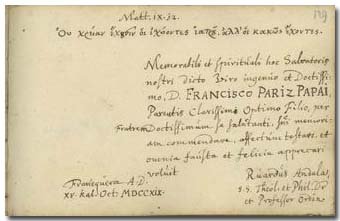
Matt. IX. 12.
 Memorabili et
spirituali hoc Salvatoris nostri dicto viro ingenuo et Doctissimo,
D. FRANCISCO PARIZ PAPAI, Parentis Clarissimi Optimo Filio, per
[Fratrem *] Doctissimum se salutanti, sui memoriam commendare,
affectum testari, et omnia fausta et felicia apprecari voluit
Ruardus Andala,
S. S. Theol[ogiae] et Phil[osophiae] Dr.
et Professor Ordin[arius]
Franequerae A. D.
XV. kal. Oct. MDCCXIX.
|
* Mt 9:12: Vulgate: “non est
opus valentibus medico sed male habentibus.” *
The word “Fratrem” was inserted later.
|
|
|
They that be whole need not a physician, but they that are sick. Mt
9:12. *
I want to recommend myself into the memory of
the noble and learned young Ferenc Pápai Páriz, outstanding son of
his eminent father, who sends his greeting through his brother,
with this remarkable and spiritual saying of our Saviour; giving
proof of my warm feelings, and wishing him all the best and
happiness,
Ruardus Andala,
ordinary professor of theology and philosophy
In Franeker, on the 15th day before the calends
of October 1719.
|
p.
129. Franeker, September 17, 1719
Andala, Ruardus ab
(1665-1727), Dutch philosopher and
theologian
Ruardus
ab Andala (ab Andla) was born at the beginning of January of 1665
in the West-Frisian Burgwerd, a son of the farmer Gerlof Ruurds
and Truike Wigles. His talents were evident already at an early
age, so he was sent to the grammar school of the nearby Bolsward.
In 1677 he lost both of his parents. Already in 1679, at the age
of 14 he went to the academy of Franeker, where two years later he
defended his dissertation under the presidence of the elder
Campegius Vitringa. He learned philosophy, Greek language and
theology, with such free-thinking and Cocceian professors as
Vitringa, Röell, and Johannes van der Waeyen (1639-1701). In 1684
he responded to four new disputes. In 1687 he attended the
universities of Utrecht, Leiden and Dordrecht. From 1688 he was a
pastor in Arum and Makkum, and from 1695 in Bolsward. In 1701,
after the death of Johannes Schotanus (1643-1699)
he was invited to Franeker as a lecturer of philosophy. In 1709 he was
offered a post of ministry in Haarlem, but he did not accept it.
In 1713 he was appointed professor of theology, a position he kept
until the end of his life. He died in Franeker on September 12,
1727. He was a great defender of Cartesian philosophy. He attacked
Leibniz because of his concepts of vis activa and
substantia. He was the author of several writings of
controverse, amongst other against Balthasar Bekker (1634-1698).
His oeuvre includes amongst other:
Disp. de Urim et Thummin, 1681. – Disp. de Terra et de igne,
1784. – Existentia Dei non modo a posteriori sed et a priori
demonstrata, Franeker, 1705. – Disputatio physica, in qua
ostenditur, corpus nec in infinitum, nec in atomos dividi posse;
resp. Heinsius Boeder. Franeker, 1705. – Exercitationes
academicae in philosophiam primam et naturalem, in quibus
philosophia Renati Des-Cartes explicatur, confirmatur et
vindicatur. Franeker, 1709. – Paraphrasis in principia
philosophiae Renati Descartes. Cui subjunctae sunt Variationum
aeris atmosphaerici ephemerides a 7 Id. Oct. A. 1709 ad mensem
Julium A. 1710. Franeker, 1710. – Syntagma
theologico-physico-metaphysicum, complectens Compendium theologiae
naturalis … Franeker, 1711. – Dissertationum
philosophicarum heptas. De argumento pro existentia Dei a
priore. De essentia mentis humanae. De distinctione mentis a
corpore. De unione mentis cum corpore. De voluntatis libertate. De
immortalitate mentis humanae. De corporum fluiditate [et] duritie.
Franeker, 1711. – Disp. physica, qua representatur Cartesius
verus Spinozismi eversor et physicae experimentalis architectus;
resp. Georg Szoboszlai. Franeker, 1719. – Verklaaring van de
Openbaringe van Johannes, Leeuwarden, 1726.
The notes of the elder Vitringa, then Andala and
the younger Vitringa follow each other in the Album, all the three
wrote their mementos in September of 1719 (pp.
325,
125). At this time all of them were
professors of the university of Franeker. At the end of the 1680s
Röell was also a professor of Andala in Franeker, but from 1704 he
already lectured in Utrecht: it was here that made his note in the
Album of Ferenc Pápai Páriz (p. 111).
• Boeles
II 356, 843 • Jöcher • Jöcher-Adelung • NNBW I 124 |

